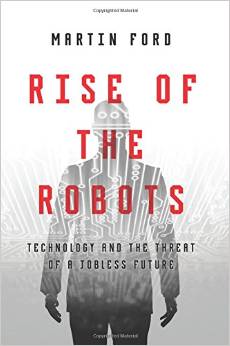Rise of the robots
Technology and the Threat of a Jobless Future
13 Jan 2018
View Comments
#bookreview
#robots
#automation
#jobthreat
#technology

Rise of the Robots: Technology and the Threat of a Jobless Future by Martin Ford was published in 2015. This book had interesting views on how robots (AI / automation) could put risks on the employments which could eventually impact our economy. The author gives a brief introduction to the current status of the technology. He also discusses the paradigm shift in education, health care challenges, and the future ahead of us where he interestingly brings the discussion of the inevitable “singularity”.
There are definitely change in our society. The author lays down one of the comparisons against the past,
“In 2012, Google, for example, generated a profit of nearly $14 billion while employing fewer than 38,000 people. Contrast that with the automotive industry. At peak employment in 1979, General Motors alone had nearly 840,000 workers but earned only about $11 billion—20 percent less than what Google raked in. And, yes, that’s after adjusting for inflation.”
This is a very good view of how much society changed compared to before. The changes are obviously happening which are to be recognized and accepted progressively. However, we should avoid “comparing” ourselves to the past. We should definitely “learn” from the past mistakes but I believe there is no point in making comparisons to the past vs present. Without any doubts, hiring 840,000 workers in the year 1979 was the best option for GM at that time. It’s what those guys could do best at that time of what they had. The point of this quote is probably to understand the improvements in our society as the years are passing by and recognize and accept the changes.
As a person with the interest in robots for quite some time, I have my own inputs and thoughts regarding the robots. I wanted to compare my thoughts in contrast to the author’s to review the different characteristics. Obviously, I am not agreeing with every topic written in the book. I would say these topics could be approached side by side with author’s opinions but in slightly different manner. Let me briefly comment on my thoughts on some of these topics.
- Are robots (AI) really the threat to humans?
If robots turn into a real human-like creature that could somehow take over humanity, the threat is undoubtfully there. This certianly is not impossible. However, if you think about how AI works these days in depth, it first gathers the data, then filters the data to its need and eventually concludes to do a thing, it normally has a pretty well-defined task/rule. Let's take a look at the recent phenomenon in AI, AlphaGo from Google Deepmind. It does very good at its task which is to calculate the highest possibility of placing a Go stone in the game of Go. However, let's say you change the rule slightly every minute. Even when the change is trivial to humans, AI will have a tough time adjusting to it because it was trained to do under specific rules. Adjustment could take hours, if not days. If you look at the robots, they aren't all that super intelligent at all. Robots will certainly do their best for the task given to them though. We humans provide these tasks with rules, we most likely will have the controls over them. We often try to connect robots and humans, but I just can't picture myself on how robots will change their conditions/rules and adapt themselves to do their own things. I personally do not see robots as a threat. - Working together with robots
As I insisted above, robots really aren't the threats. Let me give you some examples to convince you better. I don't think anyone would say their cars are the threats these days. However, I am certain when the cars were first introduced, people probably feared to ride on it. Think about airplanes. We know the chances of having an airplane crash is extremely low (1 in millions). Yet some of us even now (including myself), are feared everytime we get on the flight. I agree if airplanes crash, the outcome would be pretty bad and disastrous, but that's the consequences we burden with every time we are on the flight. Bearing those risks, we still get on it when we have to travel oversees. If you think about it, we can work together with robots just like cars and airplanes. Robots would undoubtfully help humans work efficiently and effortlessly. They are not the enemy, they should ought to be our friends. - Unemployment
Robots sometimes are seen as bandits which steals people's jobs. This isn't necessarily false since they are in fact taking over many human jobs. If you look closely at the factories these days, the number of workers have reduced by folds because the robots can do their job efficiently and tirelessly. Unemployment for those "repetitive" works are really anticipated to be disappeared. Technologies are developing ever faster every day. Paradigms shift day by day. We shouldn't be fixed to the old-minded thoughts (repetitive). I believe new employment will most certainly be made. These new jobs would probably gear toward the creativity and innovation. Change your thoughts and think outside the box. It is time to let go of your fixated behaviors. Heck, a lot of us might lose their jobs and then we might be living with some sort of guaranteed basic income. - Singularity
Here is an interesting topic which most of us probably thought about it, the technological "Singularity". Simply put, this is the point of time when AI has their own thoughts and move beyond all of the human intelligence. The "Singularity" has always been on the topic since early 1900. Without any direct objection to these theories, AI currently is missing a key feature though compared to human aspects, the "feeling/spirit" aspects. I believe it is those feelings/spirits which would create their own thoughts. It is undoubtly possible that this "singularity" could arrive in the future. Movies often describe the singularity with the rarest and the most extreme outcome which would be a world ruled by the robots. Really? Why do humans always have to fear the robots? It's probably because we know we are going to be the overcomers if the abruption of robots ever happens. However, have any robots ever been harmed the humans by purpose? Let's assume they harmed us. Can we then just assume the robots taking over the humans and start their own society? Can't we then factor in those mistakes and modify the behaviors bit by bits? Just like how any other technology evolves over time. I firmly believe robots and humans can all work together. We do not have to be enemies from the get-go.
My Overall Rating:
